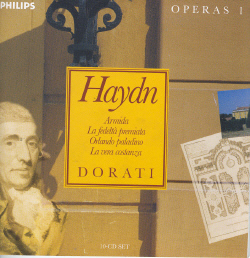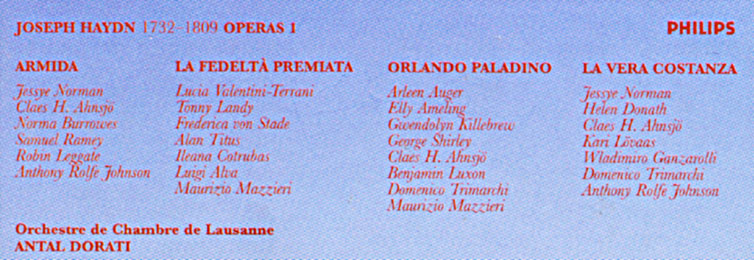 Haydn
- Orlando Paladino, Armida (and six other operas)
Haydn
- Orlando Paladino, Armida (and six other operas)
Soloists with Lausanne Chamber Orchestra/Antal Dorati
Philips 473 476-2 & 473 851-2
(2 X 10 CD sets; 10 hours each box)
"Take
away Mozart and we would know and delight in Haydn's operas much
better than we do" (Lindsay Kemp).
Antal Dorati's
pioneering recordings of Haydn's operas, some of which have latterly
been taken up as vehicles for Cecilia Bartoli, have been collected
together in two attractively priced boxes. The transfers are excellent
and the whole project was a notable labour of love for all concerned.
In this preliminary
response I concentrate upon Haydn's version of an episode from Ariosti's
popular Orlando Furioso; Antal Dorati's Orlando Paladino has
pride of place in my LP operas collection, alongside those from
his pioneering complete Haydn symphonies project, and it has been
salutary to take it down from the shelves, and marvel upon the lavish
elegance of the original presentation of this Radio Swiss/EBU recording
made in Epalinges, Switzerland. My quotations are taken from that
12" box. Karl Keringer's historical essay puts the opera in
perspective, and Dorati's letter from which I quote does so for
the recording.
It has been
a pleasure to listen through this inventive 'dramma eroicomico',
successful in Esterhaza (20 performances there 1783-84) and thereafter
seen widely in Germany and Eastern Europe. Likewise, what a pleasure
to follow it with the two-foot across spread of the LP book on one's
lap! Clear black on white print of good size and all the words in
four languages.
Purchasers of
the re-release will have no such luxuries. Glossy paper, portraits
of Haydn and Dorati, but no libretti texts. Lindsay Kemp has but
two pages to introduce four of the Eszterhaza Operas, a single column
given to Orlando Paladino with two pages to summarise the
intricate plot, those all in English, French and German, but nothing
else,in the sung language, Italian. One has to turn pages back and
forth constantly to keep track of the singers and their roles, and
their registers (required by some reviews editors) are not given.
Track number references are provided, and do help for programmed
listening even if you don't understand Italian and prefer to skip
the recitatives. I find secco recits tedious when I cannot
follow them, and Dorati himself at the harpsichord rather stolid.
Haydn consciously
combined comic and serious elements in this opera and there are
interesting parallels and affinities with Don Giovanni (Medoro/Don
Ottavio; Angelica/Donna Anna; Pasquale/Leporello), even though Mozart
was unlikely to have known Orlando Paladino. Haydn's dramatic
limitations when compared with Mozart are well known, and were recognised
by Haydn himself. In fairness, however, readers should note that
Antal Dorati finds this treasure trove of operatic music to have
"not one moment that would not be 'good' approached or conceived
solely as expression in sound", so there should be no problem
for opera lovers who do not share my concerns and will be content
to listen to this music for the singing and its alert, stylish orchestral
support. A roster of great names were recruited amongst singers
of the time (indeed, it seems as if nearly all the most distinguished
singers then before the public were keen to get into this uniquely
important project) and it is good to hear some of them in out of
the way repertoire.
I have played
through the two CDs of Armida with mixed feelings of wonderment
and frustration. It is a serious opera seria with several fine roles,
all well taken. I liked Claes H Ahnsjö as Rinaldo, the central
character coping with conflicting desires and obligations - a rather
dry voice, which reminded me of another northerner, Aksel Schiotz.
For ravishing beauty of line, spinning legato phrases magically,
Jessye Norman is ideal,and more interesting pleading than when castigating
Rinaldo furiously for abandoning her.
I skipped most
of the secco recits (though conscious of all the hard work
undergone in preparing them) but tried to make sense of the many
recitativi accompagnato which advance the drama, connecting
series of arias in lengthy series. The synopses given are totally
inadequate and leave you to hear the music virtually out of meaningful
context. And what marvellous music there is, again and again in
this original, masterly opera. My impression thus far is, without
making comparisons or seeking to belittle Mozart's canonic masterpieces,
that there is an unjustified imbalance between the constant, desperate
efforts by all opera companies and stage directors to present the
Mozart favourites ever anew, and the relative neglect of Haydn's,
most of them still relatively unknown several decades on after these
recordings.
I hope to return
to the other Haydn operas in Box No 1 and those in Box No 2 in the
future and meanwhile will explore the possible availability of the
libretti of Carl Zytowski's English translation of Nunziato Porta's
for Orlando Paladino, as supplied with the LPs, and his adaptation
of the sources for Armida, as well as those for the other
Haydn operas now put out in this economical and deceptively convenient
format. I have tried La fedelta premiata, an extremely promising,
mature comic opera, but its convoluted story, with a large cast,
simply does not come to life heard this way, and the humour goes
for nothing.
Who takes the
commercial decisions about how much and which supporting literature
to print for re-issues? Has market research established that the
concerns regularly reiterated by critics do not affect purchasing?
How will people actually listen to the cornucopia of marvellous
music locked away in these ten operas? Will they play through all
the twenty CDs with the superficial understanding which Philips
enforces, possibly as background music? Without more thoughtful
presentation, this reissue will probably not save most of them from
falling back to languish in obscurity again.
*It
would be helpful to have feed-back from readers with views about
texts and translations of vocal works, about which I have written
and published for many years? Do you share my opinion that Philips
has probably made a false economy?
*A reader's response: Thanks for your review of the re-issued Haydn operas. You concluded with: "It would be helpful to have feed-back from readers with views about texts and translations of vocal works, about which I have written and published for many years? Do you share my opinion that Philips has probably made a false economy?" Yes, I think this is false economy. Slim-line packaging is fine for instrumental music, but to bundle eight Haydn operas into boxes like this, with libretti not included and (fatally) not even obtainable, makes no sense. They could at least make the libretti available via download for buyers of the CDs. Personally, I may post an inquiry on Usenet on the off chance that someone has PDFs of the libretti available. If not, I'll regretfully refrain from purchasing this set. And I wonder who will want to buy it. Casual listeners and seekers of (as you put it) "background music" will look to less specialized repertoire. I am disappointed in, and a bit confused by, this release.

Comment from a correspondent:
I found the review of ‘Orlando Paladino’ very helpful and I am very disappointed indeed by Philips’ decision not to provide texts with their reissues. It will certainly prevent me from considering them. I do in fact have sets of ‘L’infidelta delusa’ and “La Fedelta premiata’ but would have considered duplicating them for the sake of the other operas had they been properly presented. I was particularly interested in acquiring ‘L’incontro improvviso’ but not in the reissued set. Even if one were fluent in Italian, which I am not, it would be extremely difficult to follow an opera without the libretto. I believe that, musically, Haydn’s operas are grossly underrated and merit careful listening. They are full of absolutely delicious music but I don’t think that a reissue in this format will do anything to help their cause. Shame on Philips who hitherto had done so much for the operas. I cannot believe that there will be any market for them in this form.
Incidentally, I have Harnoncourt’s brilliant recording of ‘Orlando’.
Roger Wickson
|

